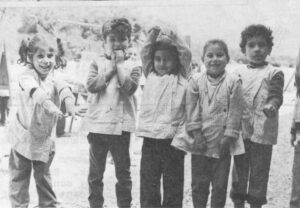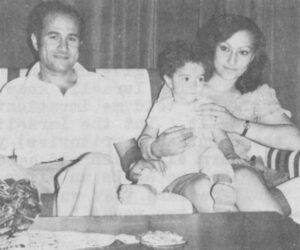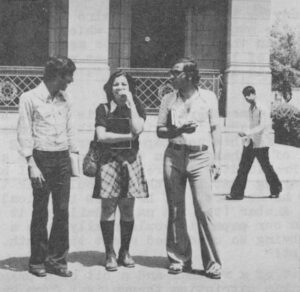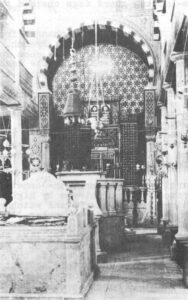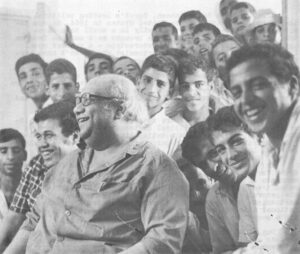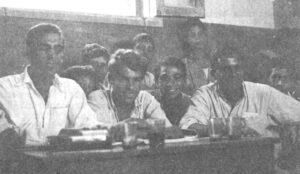"I'm from Gaza. What's the West Bank to me?"
— Beirut lawyer
"There is something worse than having a West Bank state and that is having nothing."
— PLO official
Preface
Confronted for the first time in twenty-five years with the real possibility of a state of their own, the Palestinians are embroiled in internal debate over what they want — and what they are willing to accept.
The various resistance groups have put forth contradictory positions. But it is difficult to know what the Palestinian people want since this “people” is scattered, with few real links, over continents: the West Banker living under occupation; the middle class Beiruti, earning a good income and fairly well assimilated into Lebanese society; the émigré working or studying in Europe or the United States; the oil technician in the Gulf; the refugee in a camp, etc. etc. Some PLO officials have even suggested a referendum should be held for all Palestinians, an unlikely possibility.
This newsletter, which looks at successful Palestinians in Beirut, is the first of several in which I will explore the feelings of different segments of the Palestinian constituency.
When you walk down Beirut’s chic Rue Hamra, past the sidewalk cafés and New York priced dress shops, the superbly stocked bookstores and pinball parlors, you can see the mark that thousands 1 of middle class Palestinians have made in Lebanon.
Their names stand out on innumerable doctors’ and dentists’ shingles hanging from apartment balconies along Hamra’s cross streets, They own many of the smart clothing shops; work in the engineering consulting firms springing up in Beirut to service Arab capital; own construction firms; are active in banking; teach at Beirut’s universities, etc. At night you can see groups of smartly dressed Palestinians eating kebab and broiled chicken at the Horshoe Cafe on Hamra and likely as not discussing the possibility of a Palestinian state.
These are the people, or the children of those, who were able to leave Palestine in 1948 with some money, and/or who had relatives in Lebanon, enabling them to start over in Beirut. Many, escaping with barely enough resources to keep them out of the camps, worked their way to success in true Horatio Alger fashion. Often this depended on one or more family members spending lonely years working in the Persian Gulf and sending money back to educate the family.
Most of these Palestinians had the money, connections, or position to obtain Lebanese passports, which spell the difference between those who can work without special permits and thus live securely, and the stateless refugee whose job prospects are constantly vulnerable to the whim of unsympathetic government officials.
In any Palestinian state, this class of citizens (and their counterparts who have emigrated to the Arabian Gulf, the rest of the Arab world, Europe and the United States) would be important to development — if they went back. And the attitudes of this sophisticated and well-educated group towards living with Jews certainly provide some clues to the possibilities of co-existence.
I have spoken with doctors, dentists, architects, engineers, professors, merchants, an accountant, secretaries, housewives, UN professionals and teachers — both Moslems and Christians. My sample is not scientific: it comes mostly from the comfortable Ras Beirut area. But it gives some idea of the mixed emotions felt by Palestinians who have “made it” outside but are still drawn, in a variety of ways, to what they left behind.
The “state question” is discussed incessantly, over coffee, at parties, at political meetings, on campus. “We’ve been talking about it for twenty-five years. Now we just talk about it more,” a middle-aged grey-haired Palestinian secretary sighed. An air of resignation hangs over most conversations, a feeling that the situation is out of their control and the Palestinians are once more going to be acted upon rather than actors. They know the options are unclear as are the wishes of the two other principal players, the U.S. and Israel. They know the resistance movement is militarily weak and that the major Arab powers want a settlement.
Conversations go around in circles, one minute hopeful, the next depressed. One Palestinian intellectual told me fiercely, “I could never accept such a puppet state: In the next breath he added, “But, of course they will give it to us whether we accept it or not, so we’d better make the best of it.”
I found in many of these successful Palestinians an ambivalence towards their own national identity. Until 1967, most of them had settled into Lebanese life and, on the surface at least, were hardly distinguishable from the natives. The Six Day War in 1967 revived awareness of their past, and since then they have been constantly reminded by the existence of the commando organizations.
Many of these Palestinians would probably not go back. A tourist agent told me his business in Beirut was too good to give up. An economist said that his children had grown up here and would not want to leave their school and friends. Others told me they were uncertain whether their professional skills would fit into a West Bank economy.
But over and over the question of choice was raised, the right to choose whether to stay in Beirut or return. “Until Palestinians can go to Haifa and then leave because they have chosen to leave, they will still be refugees, ” I was told by a doctor who admitted that he might not leave his well-established practice in Beirut to return to his childhood home. People also want the right to visit, or to retire to their birthplaces. “After all,” a young housewife told me, “if we could drive across the border, Haifa is just two hours away.” It is this closeness, which adds to the frustration of not being able to see friends and relatives still living inside Israel or the West Bank. (Some people can, of course, get permits to visit the West bank during the summer — a palliative but hardly a solution).
Even the prosperous often feel an acute lack of identity, a sense that the Lebanese resent them for their financial success on the one hand and for the political agitation of the commandos on the other, “The sense of not belonging is terrible,” I was told by the wife of a wealthy merchant whose family originated in Jerusalem but fled in 1948 to Amman and then Kuwait. “We hold Kuwaiti citizenship,” she went on, “and we live well in Beirut, but we don’t belong anywhere. I feel like someone in a camp.” (Of course, for those who hold only Palestinian identity cards and no passport — including those in the camps and many outside — identity problems are far more concrete and acute — difficulty in movement, work, and travel.)
Sometimes the alienation is more subliminal, emerging suddenly in the middle of a conversation. I was sitting in the cafeteria of the American University hospital, chatting and joking with six young Palestinian doctors, whose families were scattered all over the Arab world. Suddenly, a tall, dark, longhaired house doctor, a native of Ramallah on the West Bank, who had been quite silent until then, started to shout. “Did you know that Palestinians can’t get jobs in most Arab countries? Did you know that in some Gulf states Palestinians can’t visit the oil installations? Did you know, that I, as a Palestinian, cannot go down to visit the refugee camps in South Lebanon?” He rolled his eyes in disgust, smiled, and the conversation relaxed again.
Middle class Palestinians often expressed guilt pangs to me about the conditions of the refugees (though most of the former have little or no contact with the latter and had never visited any of the six camps within a half hour of downtown Beirut or other camps outside. When I returned from visits to camps I was questioned eagerly by Palestinian acquaintances about the refugees’ opinions.)
Some of the middle class would like to help but don’t know how. Jamil Hamdan, a tall, attractive engineering consultant with a PhD, from the University of Illinois, was scarcely aware of his Palestinian background when he left Beirut to the States for graduate study in the mid-1960’s. His mother had told her children little about Palestine after they fled Haifa for Cairo and then Beirut in 1948, because she believed that they would have enough problems adjusting to a new environment and more strained economic circumstances. Ironically, his awareness developed in the States. “I saw how Arabs were treated and I became informed on the Palestinian question.”
Now, back in Beirut, and married to a lovely young Palestinian pediatrician, he feels powerless and unable to affect his people’s future. Once, he and a group of engineers went into a refugee camp to set up a tutoring program for students. But they were met with hostility and found it almost impossible to relate to the youths. All but Jamil and one friend gave up immediately. Now he tutors two camp students privately in computer programming. Prosperous, well integrated economically and socially into Beirut life, he is mentally uneasy at his inability to act. He knows he could live comfortably here, but he asks, “What about the camps?”
I encountered in a few middle class homes an attitude towards the camps which I don’t fully understand but I think gives some insight into the identity problems of some successful Palestinians. At dinner one night in a modestly well-off Palestinian home I asked my hosts whether they thought the Arab countries should do more for the refugees. (Because they insist that this problem was not caused by the Arabs, the Arab nations contributed only 2 1/2% of UNRWA’s budget for fiscal year 1974). I was violently attacked by two daughters of the house — both graduates of the American University of Beirut — who argued that if the refugees were aided economically they might not become fedayeen.
This outlook was vehemently attacked by Dr. Nabil Shaath, a leading PLO theoretician and head of the Public Administration Dept. of AUB. “We have shredded the theory that you shouldn’t give Palestinians amenities in the camps, the feeling of political intellectuals that they can have amenities and keep their identity but that the refugees would lose it. The regaining of self-confidence after the resistance grew helped change this mentality. You have to equip Palestinians to be first class citizens when they go back.” The PLO Planning Centre, which Dr. Shaath heads, is trying to set up kindergartens and other social facilities in some camps.
One Palestinian woman sociologist with whom I discussed this issue presented an interesting theory. She said angrily, “The middle class who take this approach need the camps to maintain their own sense of identity in the diaspora in the same way that American Jews need Israel.”
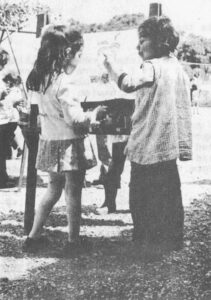 | Children paint at a private kindergarten in Shattila Camp run by Palestinian women. |
But for some Palestinians identity has never faltered and the memories rub constantly like a burr. They have simmered for 25 years in pure resentment at what they feel is a gross moral injustice to their people, which the world has ignored.
Dr. Eugene Maklouf is a thing serious dentist from Haifa with a long, sad face that lights up suddenly when he smiles. His office is on Hamra Street at one of its busiest corners, across from the popular Strand Cafe. “There are so many places I want to go back to,” he tells me as we sip Turkish coffee at the Strand. “The streets in Haifa where I walked to school, where I fought with friends, the shops. Perhaps it would all be changed and I would want to leave — the Hotel Dan now stands on my family’s land — but I want the possibility.”
“There is a stone in Haifa that I want to see. My mother is buried there. My father told us we should always pray for her on the day she died. I’ve never seen the grave all these years. They’ve probably moved it somewhere but I want to go back and look.
“I still see my same friends from Haifa here. We seek each other out at parties and talk about things, which we did twenty-five years ago. If these things hadn’t happened I often wonder how we would have been living.
“I still keep at home a pair of stockings, a knife and an old picture album. That’s all that’s left of our home in Haifa. I tried to write to the people in the pictures so we could keep up,
“I must have the right to choose whether to go back.”
Attitudes towards the Jews
I found among most middle class Palestinians I met a striking lack of personal hatred towards Jews and what I believe is a genuine willingness to live with them. A majority of the people I spoke with knew I was Jewish. Most took pains to distinguish between Jews and Zionism. But they insisted they could live with Jews only on a basis of equality.
Dr. Maklouf told me, “I try to get my son not to see religion as a differentiating factor. I taught him we are not fighting the Jews. If a Jewish friend from abroad comes (Dr. Maklouf has sought out anti-Zionist Jews in trips abroad), I make a point of introducing him.” He admits he is not sure whether his son understands the distinction.
Often, Palestinians who had lived before 1948 in mixed cities like Haifa or Jerusalem where relations between Jew and Arab were good would go to pains to relate stories about friendships they or their parents had had with Jews. A Palestinian lawyer recalled: “We had Jewish friends in Haifa and Jerusalem, Religion didn’t separate us. During the 1948 fighting we only asked how each other was doing. When I had an operation I went to Hadassah Hospital (in Jerusalem) and our friend who was a Jewish pharmacist would come daily. Before we left Jerusalem I told him he had promised me a pair of boxing gloves as a present and he said tell me wherever you go and I will send them. He sent them to me in Lebanon.”
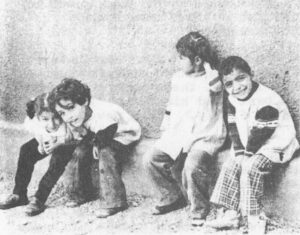 | Children at Shattila Camp 2 |
Of courses, such experiences were not universal. Palestinians who had had little or no contact with Jews as children or young adults in Palestine. And I met some hatreds.
One wealthy housewife, who bitterly proclaimed her alienation at “having no homeland”, told me, “I hate the Jews. I can’t help it. I can’t distinguish between Jews and Zionists. I have to be honest with you. I think all Jews are Zionists. Sometimes I feel it is wrong to teach them these unhealthy things, but I can’t help myself. They have to know who took their country away from them.”
And a frail widow, living with her prosperous son in a noisy though exclusive Beirut quarter, sat absolutely still, staring at the wall, as she reminisced in a bitter voice about her wealthy Haifa girlhood when “every home had a garden and Haifa was spacious and the only Jews were those who rented rooms in Arab houses.” She querulously offered me an anecdote, which her son had warned me that she repeated over and over to guests: “I don’t think the Jews will change. When I was a girl, my friend lived in a building where she had a Jewish friend. When my friend stopped to say hello to her auntie, the Jewish girl said ‘That’s not an auntie, that’s an Arab.’ You see what they were taught: I don’t think Palestinians my age can forget these things.”
Far more typical, however, was a hurt bewilderment at what Palestinians felt was Israeli scorn for their people as a whole. Repeatedly, Palestinians would ask me why the Jews looked down on them. Over and over they would cite their outstanding educational achievements as a group, almost always comparing the statistics with Israeli achievements. 3
Knowing I was a Jew, Palestinians often asked me to explain why the Jews felt superior to them. “What are they afraid of?” a talented, high-ranking UN education expert demanded. This man, who supports the West Bank state idea as a “catalyst for change”, pressed me: “What do they really think about the Arabs? What is it they object to? Why don’t they understand that you can’t take someone’s land and expect them to love you? Why is it that in the States so many of my friends are Jews but in Israel they won’t accept me? Is it that the Israelis fear being killed or that they really feel this need to expand for religious reasons?”
When the subject was raised of broadcasts in 1967 and before from Egypt by the demagogic former PLO leader Ahmed Shukairy and others calling for the destruction of Israel, these were shrugged off with ire and/or embarrassment as past dead history. “Arabs don’t hate Jews,” the UN expert told me flatly. “They never built concentration camps.”
In fact, Palestinians often raised with me the analogy of the Palestinians and the Jews: the dispersion, the success in adapting in countries around the world, family sacrifice for education as the best means of advancement, resentment by host countries of their success, a feeling of alienation in their new homes — and, of course, the desire to return. Over and over I was asked in almost the same words, “Why do they think we will forget in 25 years what they did not forget in thousands of years?” (But despite the parallel, most Palestinians insisted their claim was just but the Jews’ was a historical myth.)
Debate on the state
Few people that I spoke with were enthusiastic about the state idea, but a majority accepted it. Most would first insist that their ideal was a democratic, secular state in all of Palestine, the official PLO goal (though specifics for such a state’s workings were rarely discussed — usually because people would tell me its chances of implementation were so slight — and the only example used for bi-sectarian government was the uneasy relationship between Christians and Moslems in Lebanon.)
Having paid obeisance to the ideal, the conversation would then turn to realities. Generally, people divided into pragmatists — those who believed that for better or worse the state was the best deal the Palestinians could hope for; the optimists — those who hoped that over time Israel would change from inside and the two states move closer together; and the pessimists, convinced that the state would be a Bantustan oppressed by both Israel and Jordan.
Noted Palestinian intellectual Walid Khalidi, a cool pragmatist and member of one of Jerusalem’s most distinguished families, who teaches at AUB and was a founder of the Institute of Palestine Studies, becomes visibly impatient with questions about the economic or social viability of the proposed state. In an impeccable Oxford accent, his slender fingers drumming on his large desk, he told met “The question is, whether or not you are willing to accept less than the whole of Palestine. If so, then you try to make it as viable as possible.
“This is the time when a whole convergence of elements, the Arab states and the Israelis, seem to be focusing on a possible formula. It would be extremely shortsighted of the Palestinians to let the situation go by default.”
But Dr. Khalidi is not overly optimistic; he is convinced that the Israelis, not the Palestinians, will jinx the state idea. “Much will depend on how much the Israelis are willing to concede, what they offer. The formula is the key. If it is so emasculated, say by the Allon Plan (a demilitarized West Bank with Israeli paramilitary settlements retained along the Jordan river) than it is out. And Allon with rouge and eyelashes won’t do either.”
Dr. Khalidi’s measured British tones rise with impatience when he talks about Israeli blind spots. “The Israelis are missing an opportunity that won’t occur again. Why do they seize it on the Egyptian side and not on the Palestinian? The political leadership, even within the PLO, has moved so quickly that maybe the Israelis are not aware.
“Why do they assume the Arabs will remain static? 1973 would have happened sooner or later. How do they visualize the future of the Arab world where oil is abundant, education spreading, open to influences from the outside. Why do they assume the balance of power is on their side? October was the rustling of the leaves. This kind of qualitative change they can’t turn back.
“The Palestinians are much closer on this issue than they seem. On the West Bank there is a bedrock of understanding, a consensus on absolute basic things right across population lines. Given this bedrock, IF the Israelis read the past and future correctly and IF the Americans exert persuasiveness and IF a formula (for a state) emerges that can be accepted even indirectly….”
He looks up bleakly. “The Israelis will sabotage it. The less they concede, the less incentive for a state.”
The optimists argue that peace with Israel and a Palestinian state on its borders would stimulate change from within the Jewish state, make it more tolerant of ethnic minorities and less exclusively Jewish. They also appreciate the fact that many West Bankers are anxious to escape from occupation and willing to take the risk of a state.
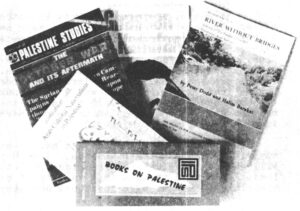 | Publications from the Institute for Palestine Studies. |
Gaby Habib, a short, eloquent Palestinian with a natty goatee, is hopeful. He directs the Near East Ecumenical bureau, a church organization working to disseminate information on Palestine. “At least if you get a kind of place called Palestine,” he says, “it will be a seed for the future and delay the final liquidation of the Palestinian cause. The state would be a philosophical challenge on Israel’s borders; a stimulus for change from within Israel would be opened up to integration. The movement of history would be taking them towards a democratic secular state. The Palestinians won’t have an army but the cultural struggle will continue.”
The UN education expert told me, “I am hopeful about this state. We can use their know-how. I am hopeful the young ones will change. Exclusivist religious philosophies like this never last. This area is used to a variety of ethnic and cultural minorities. But we have the roots and they don’t.”
All during my stay in Beirut there was fantastic interest in the political shifts within Israel among Palestinians. Journalists coming from Israel were pumped for any crumb indicating the growth of an opposition in Israel favoring the recognition of the Palestinians. I was told by several middle class Palestinians that my research would only have meaning if I wont to Israel to examine changes in attitudes there.
At one party of Palestinian intellectuals, a furious argument erupted over whether the Palestinians should try to encourage voices on the left within Israel. The majority clearly favored doing so, although they were uncertain of the means, When Naif Hawatmeh, the head of the DPFLP, permitted an American journalist to publish an interview with him in a major Israeli daily newspaper, calling for Jews and Palestinians to work towards a democratic, secular state, most middle class Palestinians I spoke with viewed this as an exciting breakthrough.
The pessimists, on the other hand, argue that a West Bank state will be a political and economic puppet, existing on international charity, and at the military mercy of Israel, Jordan, and the United States. They believe the state will be inadequate for the resettlement of all the refugees, especially those who came originally from within the pre-1967 borders of Israel.
Unlike the optimists who feel the two states would move closer together over time, the pessimists believe a West Bank state would be a weak enclave, unable to make a dent philosophically or militarily on a heavily armed Israel. “The state plan,” an angry young Palestinian lawyer told me, “means accepting territorial concessions and probably renders an end to the whole Palestinian question. You can’t come back later and ask for more.
“With a settlement, every Arab regime which has signed the agreement will try to keep the borders quiet and to disband armed Palestinian groups,” he complained bitterly. “It would give the green light for the destruction of the resistance.”
The pessimists are also convinced that internal changes in Israel can only be achieved through military struggle. “Look what happened after the Ramadan War,” a leftwing Palestinian graduate student argued. “The Israeli structure started cracking. You need another war to get the people there to realize that their system just won’t work.”
Others, like Dr. Maklouf, argue against a settlement on a philosophic basis, leaving aside the thorny questions of how exactly their ideal state would be reached. “Peace will only come,” the dentist explained, “when the Jews are accepted simply as human beings and they accept others the same way. A West Bank state would be the exact opposite, perpetuating separatism.”
By far the majority of the middle class Palestinians whom I interviewed felt a state of some kind was inevitable. This held true whether they were for or against it.
But there were two points on which nearly everybody agreed. First, that the West Bank should not go back to King Hussein. And second, that over the long run a West Bank entity would be transitory. The October 6 war had convinced them that time was on their side. For the pessimists this meant years of struggle during which the Palestinian resistance movement might disappear altogether only to reemerge as part of a general revolutionary wave, which they hoped one day, would sweep through the Middle East. For the optimists, the changes would hopefully be less bloody, brought about by peaceful contacts between Arabs and Jews on a basis of equality.
“You have to be realistic,” a young Palestinian housewife mused almost to herself as we sat together in her comfortable living room. “One year ago, I couldn’t have accepted a state. Now we have recovered our pride — now it is possible.
“But I don’t think of this state as final. Perhaps in the future there will be changes, not by bloodshed but by people changing. Young Israelis and Palestinians who have not personally been oppressed.
“Don’t you think this is possible?” she asked me wistfully.
Endnotes
- According to figures compiled by the journal of Palestine Studies in 1972, there were 240,000 Palestinians in Lebanon. UNRWA reports 187,529 Palestinian refugees in Lebanon in 1973, half living in camps and half outside. Thus, we can estimate there are at least 52,000 Palestinians with non-refugee status in Lebanon.
- Due to the fact that nearly all the middle class Palestinians I spoke with refused to be photographed, the pictures in this newsletter will be mainly of refugee children. The refusals were based partly on a lingering paranoia left over from the Israeli assassinations of three guerilla leaders in Beirut in April 1973, and partly on a general unwillingness to call attention to themselves.
- The Palestinians have probably the highest education level in the Arab world, and according to one study directed by Dr. Shaath, they compare favorably with the Israelis in numbers attending university.
Received in New York May 20, 1974
©1974 Trudy Rubin
Trudy Rubin is an Alicia Patterson Foundation award winner on leave from The Christian Science Monitor. This article may be published with credit to Ms. Rubin, The Christian Science Monitor, and the Alicia Patterson Foundation.

